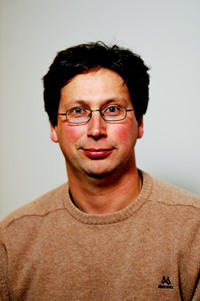Kudos to ethics committee
Nils Anfinset went to Palestine to do archaeological research for his PhD in 2002 − the most intense phase of the second Intifada. Today he teaches a class in research ethics.

Hovedinnhold
How do you justify doing fieldwork in Palestine during the second Intifada? This was something he gave a lot of thought.
“Was it right of me to work in Ramallah during the most intense time of the Intifada? Am I crossing important ethical boundaries by exposing myself and others to risk? Can my presence in Palestine and my research results be used in the conflict?” asks Nils Anfinset, Associate Professor at the Department of Archaeology, History, Cultural Studies and Religion (AHKR).
Anfinset sits on the Research Ethics Committee at AHKR and teaches the class in research ethics for master students. Last week, the Committee was awarded the Faculty of Humanities’ special price for quality of education (Spurvugleprisen).
The Committee received the prize for its work to ensure quality of examinations and for establishing the research ethics course for master students. At the award ceremony, the Vice Dean praised its work to increase awareness of research ethics at all stages of research − from project design to implementation of actual research work.
Read more at På Høyden (Norwegian only)
The Research Ethics Committee was a pioneer project established by AHKR in 2008. The committee, with one member from each subject at the department, works to promote good research practices and to uncover fraud.
Dealing with dilemmas
Anfinset remembers how his team in Ramallah made rules for how to behave and engage the local population.
“No one was allowed outside in the evening and we had restrictions on what we could talk about and with whom we could make contact. We always tried to keep in mind that our presence and our research results could be used politically in the conflict,” explains Anfinset.
“Access to research material is of course essential to research. Sometimes you have to take detours to find what you think you are looking for. And often it doesn’t provide the results you want. We had to engage the local population to find out where we could go and what areas where off limit due to political reasons – reasons we could not possibly know about ourselves,” explains Anfinset.
He says that working in a foreign culture can be challenging in itself, but violent conflict and politics add layers which require careful reflection.
“Maintaining a critical attitude to sources is an important part of research, especially when you operate in a conflict area. You have to use our own filters and identify cultural codes in the communities you work. However, it is important to never compromise your own ethical standards,” he says.
Not mandatory
The course is not mandatory, but Anfinset thinks the topic is fundamental for any researcher. However, it has proven difficult to fit such a course into the various teaching structures. All academic fields have their own special ethical challenges, and there are considerable differences from subject to subject.
“All students need to consider their sources and pay attention to proper citation techniques. I wish this course was required for everyone wanting to sit for the exam. It would raise the quality of the students,” he says.
UiB complies with the Vancouver requirements endorsed by the National Committees for Research Ethics. These Committees are independent agencies for questions regarding research ethics within all subject areas.
“I was lucky and had very good support from the scientific community in Bergen and our partners in Palestine. Today, I still think that I made the right choice," ends Nils Anfinset.
